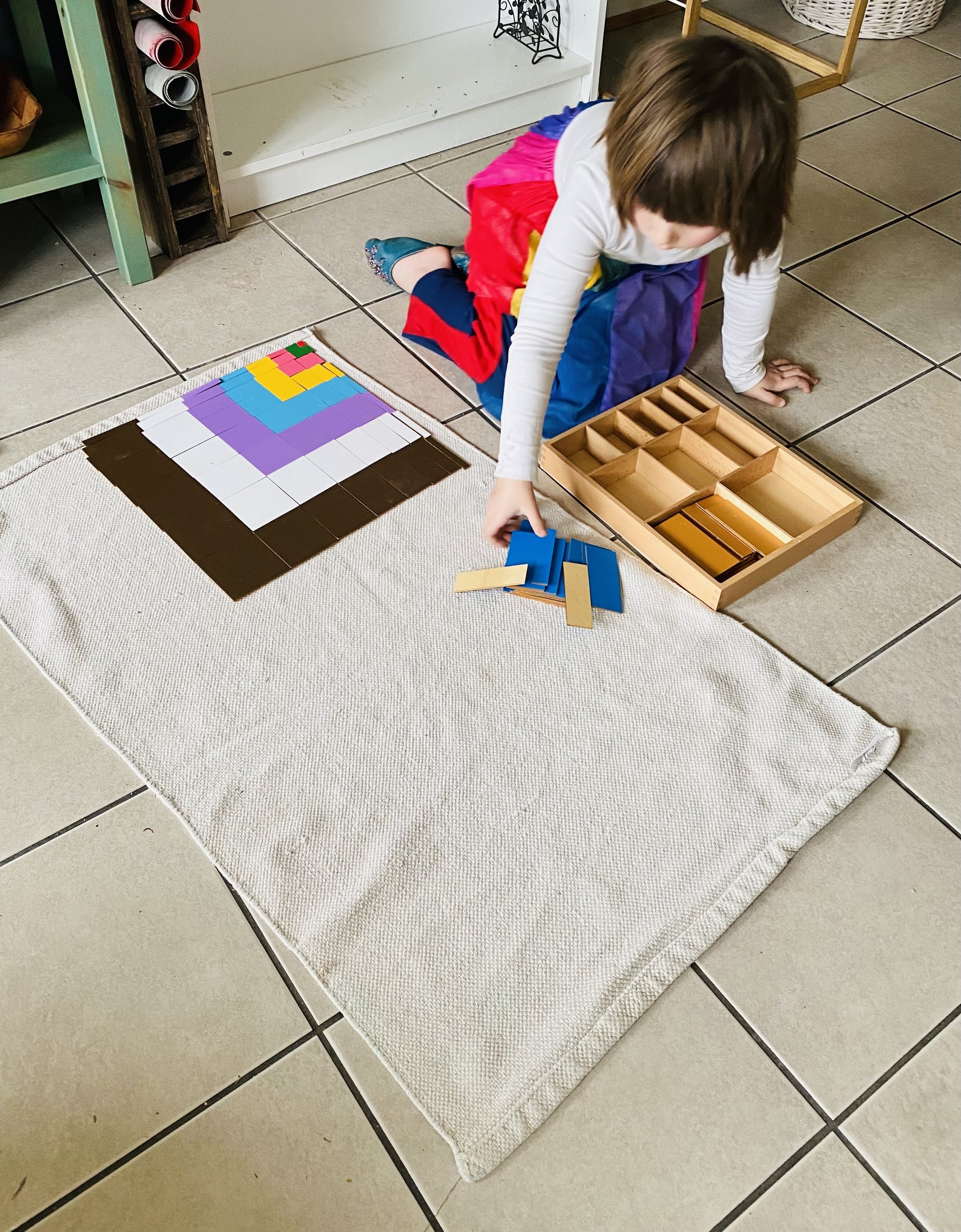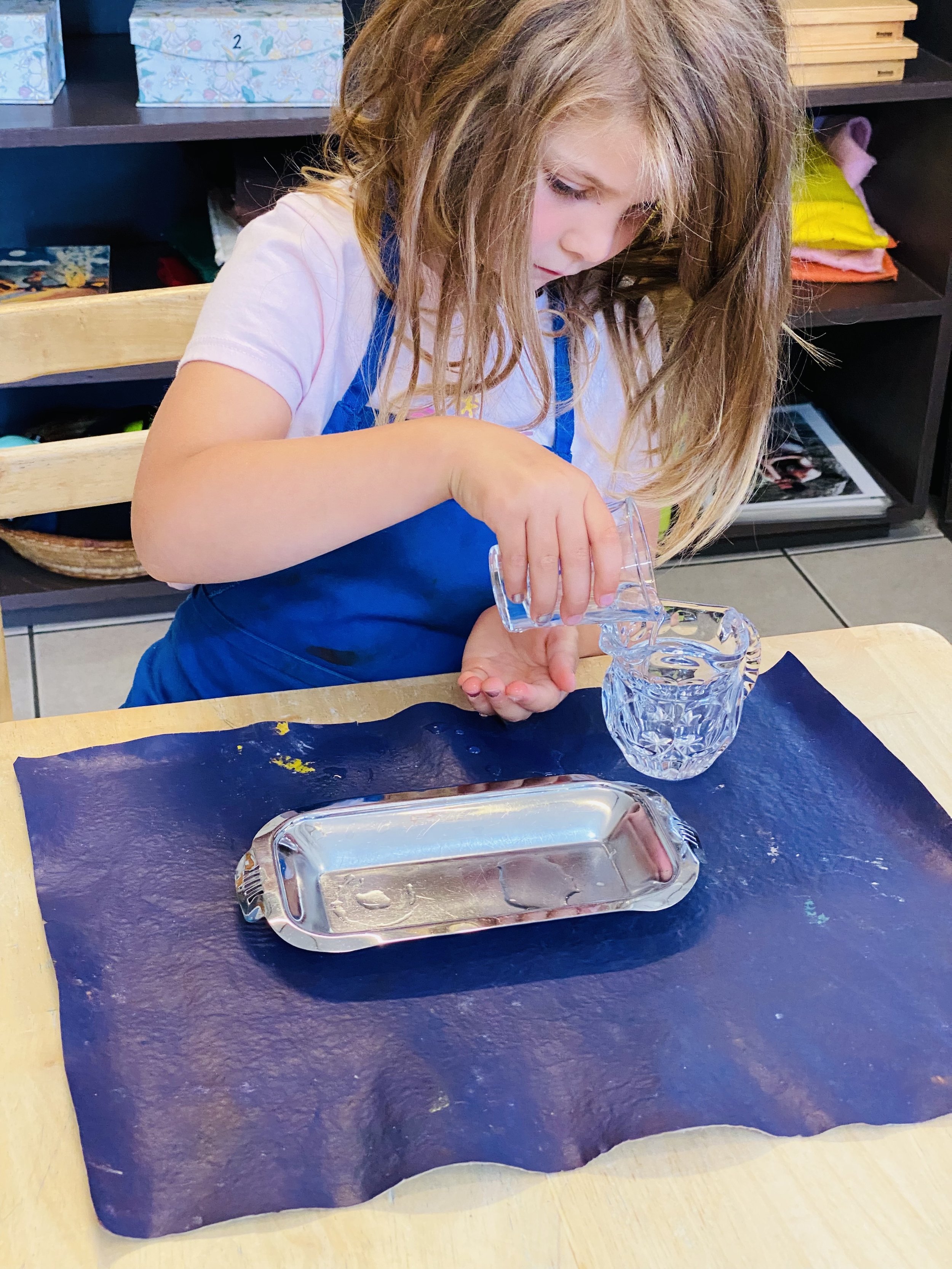The First Plane of Development
by Regan Becker
Dr. Maria Montessori viewed education as an aid to life. Her years of observing children of all ages allowed her to create an environment where children attain inner construction as they progress from childhood to maturity. The Montessori Method is based on the child’s natural progression through the planes of development, encouraging the child to engage in spontaneous and meaningful work. A challenging and nurturing environment allows the child to develop positive self-discipline, a sense of social community, and a lifelong love of work.
Language: Metal Insets
As children age, Dr. Montessori observed, they show characteristics of their Plane of Development. Each Plane is a span of six years with physical and psychological components containing powers that motivate behavior, lead to self-construction, and have special needs from the environment. Successful work in one Plane is essential for subsequent Planes. For optimal development to occur in a given Plane, three conditions are necessary:
1) An environment which is adapted to the needs and tasks of that Plane,
2) Liberty to act in that environment towards self-construction, and
3) A linking adult, who prepares that environment while guiding and facilitating activity within it.
Language: Sandpaper Letters
Through her scientific observation of children, Dr. Montessori discovered the characteristics of the developing child:
Love of Order: This extends itself to minute particulars and is expressed in an intense love of the environment and the desire to preserve the order in it. The intellect is the principle of order, so that the child’s internal order goes to meet the external order.
Love of Work: Work in this sense means any activity with a purpose, involving the child’s whole personality. In the primary environment, the child uses their hands and concrete materials to accomplish work. The child’s love of work has an unconscious aim at the construction of personality and is a form of self-expression that brings a corresponding joy. It is true creativity.
Math: Stamp Game Addition
Profound Spontaneous Concentration: This is a biological phenomenon. Children construct themselves through contact with the outside world. Concentration is unmistakable, characterized by an intense interest and repetition in the child’s work.
Attachment to Reality: The mind constructs itself through contact with reality, not make-believe. Contact with the real external world forms the foundation, taken in by the senses, and results in great imagination.
Sensorial: the Pink Tower
Love of Silence & Working Alone: This does not mean that the child likes solitude, but rather enjoys the psychological isolation which is a result of concentration. As children progress through later planes of development, they will more frequently work together in spontaneously formed groups.
Sublimation of the Possessive Instinct: Children love the environment enthusiastically, and their aim is not possession – but use. Their interest in any object leads them to a stage where it is no longer the object – but the knowledge of it – which fixes their attention.
Sensorial: the Decanomial Square
Power to Act From Real Choice and Not From Whims: It is not “doing as you please”, but doing what you really want to do.
Spontaneous Self-Discipline: This is one of the features that usually surprises visitors when they see a Montessori school for the first time. Self-discipline and freedom cannot be separated; they are two sides of the same coin.
Practical Life: Tying an Apron
Obedience: This is not blind obedience nor submission to stronger will, but a recognition of freedom and self-discipline. The Montessori child shows obedience through having the self-discipline to respect the free will of others. To carry out the command of another now becomes a joyful exercise of the will.
Independence & Initiative: The child should acquire as much independence as possible at each stage of development. In a mixed-age class of developing children there will be much mutual aid, and the children will both understand and sense how much aid should be given to one another.
Practical Life: Buckle Frame
Joy: The children form a cohesive community and share the pleasures of development. It is the joy that Nature grants as we rightly use the laws of our own natures.
Dr. Montessori considered the First Plane of Development, from birth to age 6, as the Creation of the Psychic Being and the Formation of the Individual. This six-year span of time is when the child has their strongest powers for the Absorbent Mind and Sensitive Periods, learning though unconscious absorption, concrete manipulation, and sensorial exploration. Children in the First Plane of Development need nurturance and protection with consistent caregivers. They need a sense of security and order within physically and socially limited environments. Primary age children should be given liberty to move and manipulate objects, receive exposure to language(s), and be encouraged to explore with all five senses and develop the skills for functional independence at the end of this developmental stage.
Practical Life: Pouring Water
The Montessori classroom allows for the creation of a beautiful and prepared work environment that inspires the child’s natural tendency to work. The Prepared Environment is a unique environment that can change and will evolve over time. It takes us into the real world and is designed for a particular kind of work that matches the natural interests of the child at a particular stage in life and in growth.
The room is clean and orderly. Each object has its place on the shelves and remains there, unless in use. The environment is completely proportionate to the size of the children. It is simple, limited, and comfortable. Everything is within reach. There is a well-trained and cheerful staff community ready to put the children in contact with the material that has so much power. The Primary Montessori environment has been created with concrete materials that the First Plane children may manipulate with their hands and minds.








